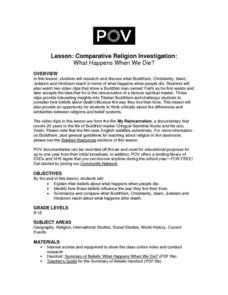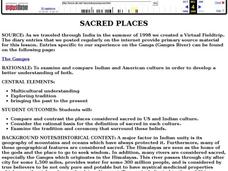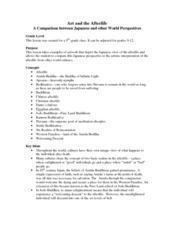American Documentary
Comparative Religion Investigation: What Happens When We Die?
How do different religions offer explanations for what happens when we die? Invite your learners to consider the variance and complexity of religious beliefs, and to research and compare/contrast the concept of death and afterlife...
Curated OER
Major Religions in Ancient India
Sixth graders explore major religions in ancient India. They compare polytheism, monotheism, and reincarnation. Using the internet, 6th graders research information to compare Hinduism and Buddhism. They create, using Inspiration...
Curated OER
The Beliefs of Hinduism: K.A.R.M.A.
In this beliefs of Hinduism study guide worksheet, students read a brief overview pertaining to religion and then respond to a reflection question.
Curated OER
Teaching the Hindu-Buddhist Tradition in East Asian Culture Through Asian Literature and Film
Students explore various intellectual traditions which dominate human history through a variety of contemporary pieces of literature which exemplify the traditions. Biblical monotheism, Greek rationalism, Hinduism, Buddhism, Confucianism...
Curated OER
African Ideas of the Afterlife and Beloved
Students examine African cultural ideas about death and the afterlife by reading and answering questions about passages from Beloved.
Curated OER
The Noble Eightfold Path
Learners gain an introduction to Buddhist teachings about moral behavior by exploring a depiction of the Buddha and by writing a speech inspired by their interpretation of the Noble Eightfold Path.
Montana State University
One Mountain, Many Cultures
Americans may think of Mount Everest as a region dedicated to adventurous hikers, but many cultures have flourished there! Learners read informative books, watch videos, participate in classroom discussion, analyze folk tales, and...
Oklahoma Bar Association
Into Which Caste Have You Been Cast?: India's Caste System
What was it like to fit into a certain class with no choice in the matter? Learners experience the caste system in a role-play activity, work individually on handouts to enhance their learning, and participate in an evaluation activity...
Curated OER
What is Life? Demonstrations & Discussion
Display seven items for your biologists to consider. Are they living or non-living? How can you tell? This is a simple outline of what you can display and questions that can be discussed as this topic is explored. One way to use this...
Curated OER
Tuesdays with Morrie pp 100-114
In this Tuesdays with Morrie comprehension and opinion worksheet, young scholars respond to 7 short answer questions covering pages 100-114 of Tuesdays with Morrie by Mitch Albom in order to help them better understand the novel and...
Curated OER
World Religions: A Look at the Way the World Prays
An introduction to the characteristics of and differences between five world religions (Christianity, Judaism, Islam, Hinduism, and Buddhism), this presentation will help to clarify some of the confusion surrounding the details of each...
Curated OER
This Land is Your Land, This Land is My Land
Students explore the difficulties, and some absurd situations, caused by repeated land subdivisions in the rural areas of poor and overpopulated regions.
Curated OER
Hinduism- Caste System Simulation
Students examine the Hindu caste system. In this religious studies lesson, students participate in a classroom simulation where they represent the castes of Hinduism and take part in a rebirth ceremony.
Curated OER
Built To Last
Students face the challenges of building big, functional structures, like bridges, domes and skyscrapers. They turn their talents to satisfying clients who have hired them to design their new home.
Curated OER
Power Totem
Young scholars investigate the important symbols to Native cultures by writing a poem. In this animal totem lesson, students discuss animal spirits and their relation to the Native American lifestyle. Young scholars write a cinquain...
Curated OER
Major Religions in Ancient India
Sixth graders compare and contrast Hinduism and Buddhism. For this ancient India lesson, 6th graders use Inspiration software to create graphic organizers that show the similarities and differences between Hinduism and Buddhism.
Curated OER
Sacred Places
Young scholars examine places considered sacred in both India and the U.S. They read and discuss a website on the Ganges River, discuss places considered sacred in the U.S., and write an essay comparing/contrasting personal sacred places...
Curated OER
Kundun
Young scholars study the country of Tibet. They watch the film Kundun and explore the life of The Dalai Lama and the recent history of Tibet. As they are viewing the movie they complete a series of study guide questions and discuss...
Curated OER
India History: The Big Picture
In this India history study guide worksheet, students read a brief overview pertaining to the history of India from about 1500 to the present.
Curated OER
Artha: Strategies for Survival, Success, and Power
Learners explain the concept of artha, recognize strategies that allow states to survive and see how elements useful in political science can be applied to getting ahead in everyday life.
Curated OER
Art And The Afterlife
High schoolers discuss various cultures and their beliefs of the afterlife in this study of Japanese art. The final evaluation is done through the creation of student collages illustrating their beliefs of the afterlife.
Other popular searches
- Hindu Reincarnation
- Buddhism and Reincarnation
- Hinduism and Reincarnation
- Reincarnation Hinduism
- Reincarnation India
- And Reincarnation






















